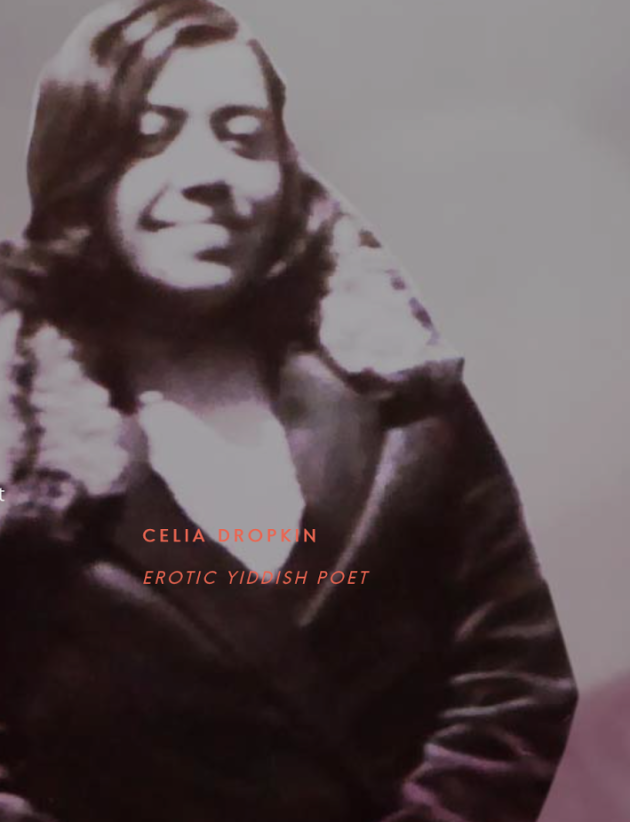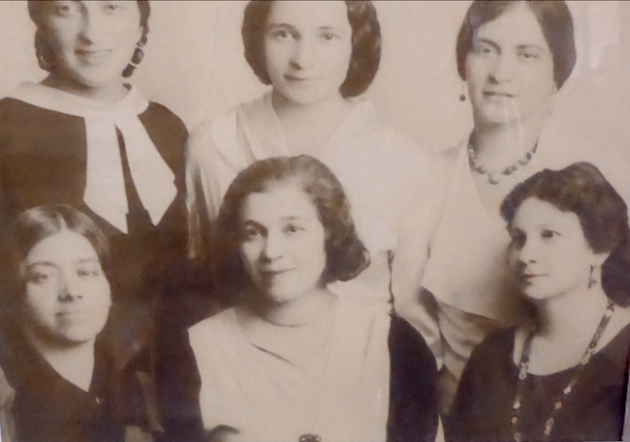The Lilith Blog 1 of 2
June 29, 2017 by Elena Hoffenberg
Celia Dropkin: No Mere Yiddishe Mame

Steamy love. Sex. Forbidden affairs. Rebellion. Outrage.
This is what Burning off the Page, a documentary in-the-works by filmmaker Bracha Feldman and director Eli Gorn, promises in examining the work and life of Yiddish poet Celia Dropkin (1887-1956). Born in White Russia, Dropkin studied in Warsaw before immigrating to New York in 1912. She gained a reputation for her ability to capture erotic energy in her poetry through explicit imagery, and also wrote frankly about motherhood and experiencing love and death as a woman. Feldman shows something other than the nostalgic world of Jewish New York by looking into Dropkin’s poetry, and her story.
Elena Hoffenberg: To start, how did you first encounter Celia Dropkin?
Bracha Feldman: I discovered Celia when I was in college. I was probably taking women’s studies and gender studies at that point, as well as Yiddish and definitely Jewish studies. I stumbled upon her when reading Adrienne Rich, who translated two of her poems, “You sowed in me, not a child” being one of them.
At first, when I read the poem, I was under the sort of impression that it was an Adrienne Rich poem. But it was so personal, and Adrienne Rich doesn’t really come off so personal, so I was a little perplexed. I went back, and I read the preface. I realized it was an anthology and it was a translation. I was sort of fixed. I wanted to know more about her.
EH: I’m curious how you’ve resonated with Celia’s work differently at different stages in your own life.
BF: My impression of Celia was first very much along the lines of the erotic. It’s so unusual, it’s so personal, and it’s so sexual. As I continued to read her, I realized that it wasn’t just about the erotic, it was also about the melancholy and about the angst and the depression and the longing and the unrequited love. I was going through a breakup at some point. There was too much identity politics related to this breakup: what did this mean related to my sexuality, my orientation? Nonetheless there was a rawness to it that, when I read Celia, I felt like she was this friend writing to me. I found in Celia’s work the universal rawness of heartbreak.
It took a couple more years to even really then get into the motherhood poetry, in which she throws that whole yidishe mame archetype on its head. [Her] narrative of pregnancy as being some sort of a dybbuk or being possessed, that pregnancy is this very disorienting and not necessarily this very joyful experience, didn’t speak to me when I was first reading Celia. Now they speak to me.
She goes after the motherhood taboos with courage and without compromising. Psychologically, we get that there was great disappointment between her and her children. To tell that story is such a privilege because it does take courage. It tarnishes something that we’re very comfortable with, that we expect to hear about women in yidishkeyt.
When you read Celia in the Yiddish, it’s a double-visceral experience because it’s not only personal, but it’s a language that triggers my unconscious in some way.

Excerpt from “You Sowed in Me, Not a Child”
Translation by Adrienne Rich.
EH: Could you speak more about the role of language and translation in making the film?
BF: The first decision I made was that I was not going to be the translator. I was going to take a position as the filmmaker as an outsider.
In terms of language, Celia was already translated–not necessarily extensively but substantially–into English and into French. We also had the translators Faith Jones and Moishe Volf-Dolman get involved with the film from the get-go. It’s very interesting, Moishe lives a couple of blocks away from me [in Montreal] and Faith lives a couple of miles away from the director in Vancouver. We both had translators whom we could call up at any hour.
That’s sort of the organic nature of the film itself. People got involved because of who Celia is and how Celia impacted them. Faith Jones speaks very personally in the film about her work with Celia’s poems. It’s not just this academic aspect. There’s a personal sort of resonance.
Another issue around translation is that even though Celia was translated, there were unpublished poems. We had debates among different translators over one word. Translation is not a mechanical thing; it is not automatic. There’s history with every word. We got eighty pages of unpublished, handwritten letters that Celia wrote in 1913 that we got sent to us by an archive in Tel Aviv. It’s 80 pages and every single person who knows of this document that we’re working with tells us, “this is going to take me a lot of time. We don’t expect this to be translated for you in, like, a month.”
EH: Looking back to how you first encountered Celia Dropkin in translation, it’s especially powerful that your film can provide translation and make her name known even more widely. We see that in some of the footage from the film’s trailer, in which you speak with students at the YIVO Summer Program about Celia.
BF: We went to YIVO because we went to Celia’s archives. That’s when we also met all of our subjects, like Sheva Zucker and other people who were at that time teaching at YIVO. We just stopped them in the hallways. We mentioned Celia and people were like, “Oh my God, we love Celia.” There was a queer element that was very strong at one point. People were understanding Celia with this kind of anti-nostalgic feeling about Yiddish. Even though the language is not necessarily accessible for everybody, it’s accessible emotionally and intellectually. You’re not being pulled to a past world that might be very cultural, or Zionist, or religious.
That’s what her appeal is. When you read a Celia Dropkin poem, you do not get a sense of when she’s writing. You can really be fooled that it’s a contemporary, 1970s at least, writer. She’s anti-nostalgic, and I think people are coming into Yiddish because they want the practicality, the day-to-day, to converse, to create and express in Yiddish, and they’re not necessarily ideologically connected to something in the past.

American Yiddish writers and poets, New York, 1920s. Bottom row from left: Celia Dropkin, Sarah Reisen, and Ida Glazer. Top row from left: Esther Shumiatcher, Malka Lee, and Bertha Kling.
EH: Do you still feel that there’s something especially important about her voice being of the past? Are her words all the more powerful because she was writing them in the 1920s and 1930s?
BF: We have to understand the norms she undermines, the places where she’s accepted and in the very same way rejected. The Inzikhistn [modernist Yiddish poetic group] rejected her as much as they accepted her. It was an ambivalent relationship. She’s not considered to have this great significant, consistent style, but she’s lumped together with the modernists. They had an intentionality of escaping Jewishness by not sounding political. They were writing in an imagist way–so very direct–and anti-intellectual in some ways as well. I was just reading [Yiddish literary critic Samuel Niger’s] essay from 1930 on the woman reader. He believed that women should be writing frume lider, pious poetry. They should sound like it’s loshn hakoydesh [literally “holy language” in Hebrew and Aramaic]. Sounds like you’re the gatekeepers of the sacred word. Celia would not have that.
I see her today as taking on issues that we still need language for. We still deal with it. It’s personal, it’s human. I won’t say that she’s universal, but we have to put her back into her context to know how revolutionary she was.
EH: It’s beautiful what you say about us still searching for the language to talk about things that Celia was talking about generations ago. It’s nice to see ourselves today in a longer tradition of people seeking to achieve self-expression, and it seems like a very fitting project for bringing Celia’s words to life.
BF: Hemshekh [continuity] is a big thing. Years ago, I heard Irena Klepfiscz talk about hemshekh and the continuity of voices. Had Adrienne Rich not translated Celia Dropkin, I would never have discovered Celia Dropkin, period. Adrienne Rich took something from the past, validated a voice, and created continuity. If I’m going to make any statement as a 32-year-old woman who has been fighting the fight that many people have, it’s voices. It’s going up to a producer and saying, yes, this woman is worth it. She’s worth it. She’s worth the story.
EH: Where does the film stand now, and where are you hoping for it to go?
BF: It’s such a delicate subject in terms of rediscovering someone’s life who didn’t sit down and write, “this is how I want to be regarded, this is how I want to be remembered.” None of that. It’s unraveling something very slowly. We launched the trailer as a way of attracting funding, as well as potential broadcasters. We’re in the process of raising money. We’ve done production, meaning we’re not filming anymore. The film is in the can, as they say and is expected to be released in January 2018.
The views and opinions expressed in this article are the author’s own and do not necessarily reflect those of Lilith Magazine.
 Please wait...
Please wait...